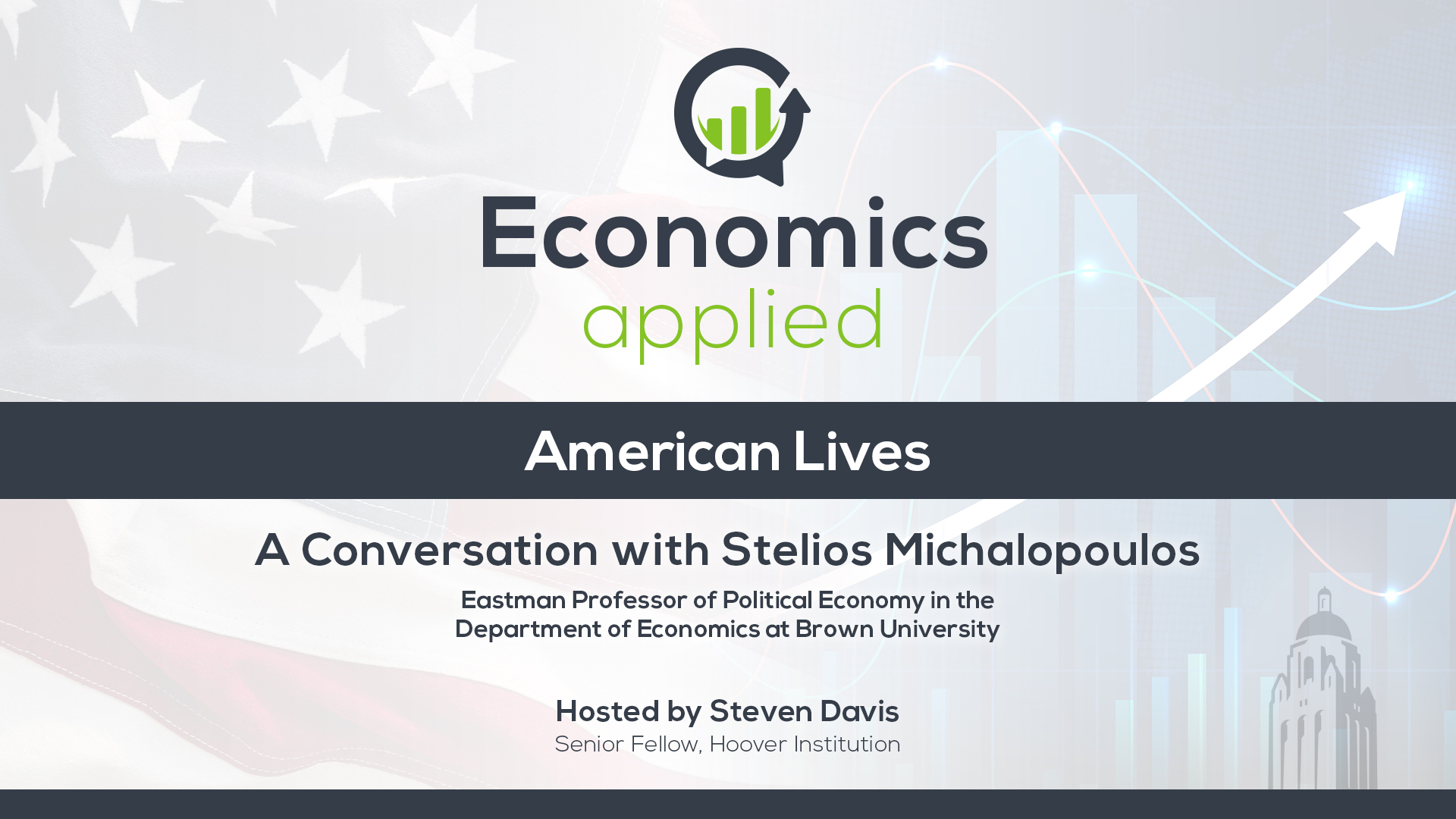- Monetary Policy
- Answering Challenges to Advanced Economies
In the 1930s, as part of the New Deal, the U.S. government hired unemployed writers to interview older Americans and record their life stories. Today’s guest examines those stories to investigate the sources of meaning, happiness, and hardship in the lives of everyday Americans. One theme to emerge is the central role of work as a source of meaning for many people. Another key theme is that men and women differ in how they find meaning in their lives and in the sources of hardship. Join Steve as he speaks with Brown University Professor Stelios Michalopoulos.
Recorded on February 27, 2025.
WATCH THE EPISODE
>> Steven Davis: In the 1930s, as part of a new deal, the US government hired unemployed writers to interview older Americans and record their life stories. Today's guest examines those stories to investigate the sources of meaning, happiness and hardship in the lives of everyday Americans. One theme to emerge is the central role of work as a source of meaning for many people.
Another theme is that men and women differ in how they find meaning in their lives and in the sources of hardship that they experience. Stay tuned as we delve into a fascinating study of American lives.
>> Steven Davis: Welcome to Economics Applied. I'm Steven Davis, Senior Fellow at the Hoover Institution and host of the show.
Our guest is Stelios Michalopoulos, Eastman professor of Political Economy in the Department of Economics at Brown University. He's an imaginative scholar who works at the intersection of political economy and culture. He has conducted research on folklore, movies, the origins of ethnic diversity, the effects of colonial and pre colonial institutions on economic development in Africa, and much more.
Welcome, Stelios.
>> Stelios Michalopoulos: Glad to be here, Steven, thank you so much.
>> Steven Davis: By the way, I should note my own connection to Brown University. Back in the day, that's where I earned my PhD. You were probably romping around in kindergarten about that time. But, I'm delighted that Brown continues to attract outstanding social scientists to its faculty in economics.
>> Stelios Michalopoulos: Thank you, thank you, Steven.
>> Steven Davis: First tell us about this American Life Histories project that happened in the late 1930s and the narratives that emerged from this project because they serve as the raw material for your study.
>> Stelios Michalopoulos: It is then that we start also talking to Hans Joachim, both our friend and co author.
Now in this project that we come to realize that there is this compilation of life histories from the Federal Writers Project that the Congress of Library has digitized and made available on its website, roughly about 3,000 stories, documents, which then I kind of lit up our interesting. Okay, now let's forget the diaries and let's actually launch onto those light histories that come more or less from the same time period.
They are collected around 1938 to 1940. The goal of this project is basically on the one hand, to give jobs to literate Americans. So this is part of the WPA, basically the New Deal agency that gives jobs to unemployed. And many of the projects at this point in time are geared towards blue collar workers.
So the Federal Writers Project is a response to the need of kind of literate workers that are out of work. And they are basically called in to collect histories and life narratives. In fact, of thousands of Americans at this point in time is part of a broader collection of material that takes place in this point in time.
>> Steven Davis: Can you tell us a bit about how the writers were selected and how the narrators, the people they interviewed, were selected? Obviously, if we're going to draw some broad conclusions from your study, we want to know something about the selection process into the data set, so to speak, and the extent to which it is or isn't representative of everyday Americans at that time in history.
>> Stelios Michalopoulos: That's right. So let's start with the first one regarding the writers, the interviewers. So as I told you in the beginning, the goal was to enlist and give jobs to literate parts of the population. And in fact, they had managed to employ some writers that eventually they would become famous.
But the majority of our writers are really coming from any background.
>> Steven Davis: So we should just think of the writers as competent, literate people.
>> Stelios Michalopoulos: Yes, because writers were not given explicit instructions about what exactly to ask. So these interviews are not scripted, and they were not scripted purposefully because they did not want to basically pre engineer answers that they were looking for because they were saying, look, we are not trying to prove anything here.
If anything, we want to learn from your interviewees about their lives. So the best way to go about is to have unscripted interviews. And wherever the interview takes you, you know, you jot down what you learned and then you move on to the next one. Which poses, of course, a problem because what are we comparing?
You know, maybe Steven is very good at getting some people to talk and open their lives. Others maybe Stelios is very validate. So maybe we're comparing there how good is Steven and how less so is Stelios so our description of this database is gonna be coming from people that have been interviewed by the same person.
So Steven would have interviewed 30 people, some males, some females, some whites, some non whites and then I would be asking the question, what is the variation within these 30 people?
>> Steven Davis: Basically, you're going to use statistical methods to control as best you can for the differences across the riders and the quality of their.
Both their writing, but also their interviewing.
>> Stelios Michalopoulos: Yes, yes.
>> Steven Davis: So that's, that's kind of okay. We won't, we don't need to go into the details of that, but there's an effort to net that out of the analysis, correct?
>> Stelios Michalopoulos: Correct. Correct. Yes. Yes. This is a careful effort.
Exactly. Because there is this absence of explicit clip that everybody had to follow while interviewing our narrators. Now, on your second question, how are the narrators chosen? This is even more tricky in the sense they were given some broad guidelines. To basically tap into associations, either labor associations or community associations, in order to get some fair representation on the ground.
Some followed that. Others, they relied on chance encounters. They on their own private networks, others, they were just going in the bars and knocking on people's doors in apartment blocks.
>> Steven Davis: Like a good approach.
>> Stelios Michalopoulos: Yeah, so it looks like that they have tried to because the goal, again, from the administration, was to get a representative kind of picture, a mirror of America.
This is what is like the language that they use at this point in time.
>> Steven Davis: Maybe it's obvious, but there's no social media then, there's no centralized list of addresses that you can easily tap. So this was a very informal approach, but partly by, as I understand it, choose writers who are scattered across the country in various locations and leave it up to them within some broad guidelines as to how to find the narrators. But the narrators were older, right?
>> Stelios Michalopoulos: Yes.
>> Steven Davis: There were guidelines there, that's important.
>> Stelios Michalopoulos: Our typical guy, our typical interviewee narrator is about 67 years old. So they were trying to get people in order to get the life history so that he.
She has mostly completed her product years. And that's an important characteristic of our set of light histories, that they're mainly coming from older guys. But now, the interesting thing is, because we're economists, right, so it goes back to your question. How representative is this sample from a typical guy in this period?
Of course, as we just said, they are not representative in terms of age. These are actually older people at this point in time. But other than that, when we basically go to the historical census in 1940 and we look at the distribution of occupations, the distribution of gender ratios.
The distribution of whites versus non-whites, distribution of immigrants versus non-immigrants. It is actually limiting pretty faithfully what we would get if we were to sample people 50 year old and above in Nebraska, if we were to sample people that are 50 years older in New York.
>> Steven Davis: Just for the non specialists listening, the US government conducted decennial censuses of households and individuals back throughout the 20th century and even into the 19th century, just as they do now.
And so there was a census conducted in 1940. And that is very close in time to when the narrators are telling their life stories. So you have a very natural and very high quality source of data that you can use to assess the representativeness of your sample of narrators.
That's what you're doing, right?
>> Stelios Michalopoulos: Beautiful said, Steven, thank you. Yes, that's exactly what we did.
>> Steven Davis: Okay, so one more kind of, well, at least one more preliminary question. So you and your co authors treat these narratives as a rich source of information about how individual Americans, looking back on their own lives, experienced and remembered hardships, overcame challenges, found meaning and happiness or sorrow in their lives, and what they saw as critical junctures in their lives.
But before we get into the kind of analysis and methods, how did you conceptualize these narratives and the information they contain? Because you need some mental structure that you have in your head before you even get to the kind of text analysis methods which are also critical in your study.
So how did you think about it?
>> Stelios Michalopoulos: We have in ourselves on this corpus that it is kind of unique, given that such a compilation has not been done since then. Parentheses, there was actually during the COVID pandemic an active debate whether it was a good idea to repeat the Federal Writers Project because of unemployment.
Again, that was shoot up during the pandemic in order to bring to life a similar project 70 years, 80 years later than the 1940s. It did not go through. But closing the parentheses now. So what we did as economists, we said, okay, let's read. Let's read and try to see David, Joachim and I, what do we think are these narratives, what they are trying?
What is a common theme that emerges? So we sat basically for about four or five months. Me, I did it with my kids. I would take my 11 year old son and I would say, look, here is a story of someone that is 70 years old in 1940 and he narrates his life, you know, in, in the Midwest or in the south or in, in, in Illinois.
Let's read it together. So basically this, you know, so before starting to ask questions, we had to listen to what the narratives are trying to say. If you were to read enough of those few dozens, you start getting some feeling of okay, so often these guys get into what brought happiness in their lives, how they lived a fulfilled life, or what elements did not allow for this fulfillment or happiness to go through.
So then it immediately kind of lit up about in David and Joachims, in my mind, that look, there's the happiness literature and that it's a very important literature in economics that tries to understand what makes people happy. And this source, this corpus, actually can shed some light on a question that has vexed economists for a long time.
We maximize happiness. That's kind of how we introduce our 101 Economics to our students. But we never exactly know what is that. We can write it down in mathematical form and assign to Greek letters a given meaning. But how exactly this comes about and how significant are these different elements?
We know, we are agnostic. So this corpus was actually a fantastic.
>> Steven Davis: Even worse than that, in some sense we do in most economic analyses, take a very strong stand on the inputs to happiness or utility, as economists often describe it. And it's typically defined in terms of consumption of material goods and services and leisure.
And that's a pretty narrow view of the sources of meaning, and happiness, and satisfaction in life. It's perfectly useful and adequate, I think, for many economic analyses, but for many other economic and social analyses, it's too limiting, okay? It misses much of what really motivates people and drives them and affects their well being.
And I think you are starting from that. You are looking at it from that vantage point, and it's one that I fully share. So you're trying to get away from the overly reductionist approach to human motivations and well being that economists are often guilty of. That's how I would put it.
>> Stelios Michalopoulos: That's, again, much better said than my attempt. And the interesting part of this corpus, again, is that it allows for a retrospective view of your life, right? Because of course, if you ask me if I'm happy now, I'll tell you, I had lunch around 12. Now I'm east coast time, so I'm relatively happy because I'm not starving.
But then, again, economists, when they motivate their models, our agents maximize some time of lifetime utility. It's not that my maximize my utility for the next 24 hours, but I take a very long view of my life and then I act accordingly and then I do what I'm supposed to do.
So these narratives actually map exactly into that. Now, after your lifetime utility has materialized, what were the sources of satisfaction or absence of it that kind of gave meaning or not into your life path? So that's one important thing to keep in mind.
>> Steven Davis: Your attention to critical junctures in your study is something that emerged from just reading these things and seeing how people conceive of their own life story.
>> Stelios Michalopoulos: Yes. And then, we said, okay, you get enough. We worked for five months, we read a lot. I can share a lot of anecdotes. But then we faced the problem of how we move from a golden pile of anecdotes into a set of summary statistics that can.
>> Steven Davis: So this is where, if you had not been subject to training as an economist, you might have gone a different route at this point. Because life narratives have been used in social sciences previously. There's a famous set of slave narratives that are the subject of analysis and economic history and maybe other fields as well.
But I think the more typical approach was some expert in an area reads 50 to 100 of these worked very closely, works hard to extract the central messages, and then writes their own summary of it. Okay, so that's an approach that's been used in the social sciences for a long time.
But you, burdened by your training as an economist, I presume, say, well, but wait a minute, that's got a lot of problems. It's too subjective, it's too subject to selectivity of interpretation by the authority, and it's not scalable and it's not easily replicated. So these are all the things an economist would say if you gave that type of analysis in an economic seminar.
And so you went a different direction, right? Have I got it right?
>> Stelios Michalopoulos: You got this perfectly right. Because you're raising now an interesting point there, right? That if you look at the synergies that the economics has leveraged over the last 10, 20, 30 years with neighboring sciences.
We would leverage a lot of data from comparative anthropologists, comparative ethnographers, like social scientists, that would work with observational studies, but then they would put a number down. The problem with basically oral historians or historians of narratives, they would rarely put a number down. So they would work with the whole passage, which then made synergies between humanities and economics.
If you look again at the trend of the last 20, 30 years, very few synergies had emerged. So this is where we found ourselves in this fantastic corpus that has been very important in the humanities realm. But then how can we break through? And this coincided with the rise of the large language models of the last two to three years.
And it was really with kind of trepidation that we went towards that path. So we said in the beginning, to be honest, we said, it is about a year and a half ago that we are now seriously thinking of how to ask these questions and how to get to extract quantitative information.
So we said, okay, maybe we can start small and have arrays. I have research funds. David has research funds, Joachim has research funds. Maybe we can basically pay a lot of arrays, hundreds of hours, read the same documents across many different arrays. And maybe that's, you know, if we read enough and multiple times, maybe we're going to get something out.
So we started with this purpose about 15, 20, 15% of the sample. Later, we realized that our research funds are getting drained at a higher speed than we expected. Arrays are falling out, some are getting very tired, some are losing their interest, so they leave incomplete work. So then, and it is exactly this time a year and a half ago that LLMs start taking out, becoming a bit more.
That they saw that it is possible, perhaps, it is conceivable to answer or to ask this question, upload your documents and have basically the LLM inference, your questions. So this is the background that then we say, okay, given our budget constraint, we really need to make something happen, meaningful happen within our budget constraints.
So this is how we proceeded. We say, okay. The way that one could have done it, which would not be very believable but cheap, was to take all the narratives, feed them one by one to an LLM, ask your question, get your answer. Tabuulate your answers, that's your summary statistics.
That would be one way that you don't critically, really engage with the output. You take it as given. You don't interrogate, you move on. Of course, we would be very unhappy to do that, right? We would say, now, why? How does it mimic? Like it hallucinates, maybe-
>> Steven Davis: Let's cut to the chase here.
I think, because the literary types and the traditional archival historians who are listening to this, their heads are exploding. Because they're gonnna say, how can you really extract the right content and meaning from these narratives if you don't engage closely with the text and you haven't got really deep expertise in related source materials?
And you're saying, look, you kind of agree that just mechanically applying these large language models, these LLMs would not be a very fruitful approach. That's not what you did. Okay, but neither did you go down the route that traditionally has been applied to the reading of narratives. You did something which I think of as a hybrid.
So you're making use of large language models, but there's quite a bit of close human reading and intensive management of the large language models. And their applications to get to an output that you think is useful as a quantitative summary of what you found, but also has some scalability properties.
>> Stelios Michalopoulos: Yes, the short version is one thing to keep in mind with these narratives is that you and I, if we sit down and we spend time reading a given narration of Steven Davis life. We may or may not agree whether element X has been a salient feature of his narration.
Now, if I get enough of humans to read the same story, there will be some model answer that yes, Steven actually among 90% of the readers would think that he actually found, loved his family. So once you have this, you can create this ground truth. So the whole idea that and little innovation that goes into this technical part of the project is to say since it is not mathematics.
That's 1 plus 1 is always 2 humans can read the same document and may actually arrive at, you know, at the. There it can be a variance in their outcomes. Let's get actually this model answer among humans and the variance among the humans that read the paper. And that's the same question, to a large language model, is the rate at which the large language model agrees with the model human.
Does it fall within the range of your humans that read these narratives at the same time? If so, we have basically kind of passed a modified version of the Turing Test. This means that if I get the answers of Steven, the answers of Claude, the answers of GPT, and the answers of Stelios, I cannot tell them apart that some are human and some are basically AI generated.
>> Steven Davis: Let me recapitulate here and put it in slightly different terms. We need some way to evaluate the outcomes of these LLMs. Okay, that's point one. And one way you might do that is to have true domain experts read a few narratives and describe their interpretation and take that as ground truth.
And that's often used when applying LLMs and evaluating their output. That's not the route, that's not the path you went here. You took a different path, which is we're going to read many inform, you know, somewhat informed, partly trained humans, and they're all, many of them are going to read the same text and you're going to get a distribution of their assessments and you're going to take the center point, the mode.
But I'll think of it as the central point for simplicity, the central point of that assessment of a group of readers as ground truth. So now I have some way, it takes a lot of work to get that ground truth reading on dozens or even hundreds of narratives.
But once I have it in hand, then I have a basis, a solid basis for assessing whether and under what circumstances can the LLMs recover something similar to the ground truth that humans have established. That's the approach you're taking.
>> Stelios Michalopoulos: Important thing in what you mentioned here, Steven, is that even if we were to get experts, the key idea here is that you need multiple experts because we don't believe that there is a single expert that possesses the whole knowledge.
So we could have repeated exactly the same procedure, not with students from universities, but with, but with other historians among the top 20 universities in the US so that we would have 20 different readings, we would still have variation among those readings.
>> Steven Davis: Yeah, another way to say it is this is a setting which ground truth itself is fuzzy, okay?
And that's often the case in things involving language, unlike mathematics, where the ground Truth is 1 plus 1 equals 2. It's not fuzzy, it's not 2.3 or 1, 1.7, it's 2. Okay, so, okay, so, so that's, so that's the approach you're taking here. I, you know, we don't have time to go into all the details, but I'll just say in, in reading your paper, what strikes me, and I Think this is important for the audience to understand.
While you are able to achieve some scalability with these LLMs, there's a lot of human input, the initial readings, the assessment of when the LLMs work well and when they don't. There's a lot of human input, expert human input, in some cases by you and your co authors to actually make these LLMs work as well, at least in some cases, not in all, as a large set of human readers doing, trying to achieve the same assessment using a very different method, namely humans versus machines.
So you don't have a. This is not a fully automated process where you just press the button and the LLM, even when through your algorithm is, is kind of give you answers from the ground up. So if I take your approach, let me put it this way, if I take your approach and I want to go look at, say, narratives of young women who migrated from rural areas into, in China to the urban centers and part of economic development in China, I might start with your study, but I'd probably need to do an awful lot of my own assessment, intervention and benchmarking and so on.
>> Stelios Michalopoulos: We are basically using a lot of tricks to get the AI to give us what is the ground truth we generate.
>> Steven Davis: Right.
>> Stelios Michalopoulos: So I think what is useful for other studies is that we offer a tool set of potential tricks that you can make AI not to hallucinate, not to be lazy.
Are they all relevant, no. Are there more tricks that one can basically involve? Perhaps? Yes, but it's kind of starting to establish best practices. Of course, they are evolving and they are not best for every domain. But it's kind of setting a first set of, here is ten things that you can try.
And there is ten iterations that can actually, once you have your ground truth, you can basically tweak around and see whether you can get the AI to reconstruct the ground truth.
>> Steven Davis: All right, so okay, I want to get into what you actually found here, but I'm gonna summarize now.
At the end of the day, you've got about 1,400 of these narratives that you work with.
>> Stelios Michalopoulos: Yes.
>> Steven Davis: You've read, many of them by humans, but then you do just do some scaling up with your fine-tuned application of AI tools, okay, reading these narratives, characterizing them systematically.
So tell us what you found. You know, what are the, what are the. I know you have many findings in the papers, but what are the key ones? I, I highlighted some of them at the outset in my opening Remarks, but let's. Let's dig into some of them.
Maybe we start with work, you know, and. And its role as a source of meaning in the lives of many, many people. Not everyone, but many people.
>> Stelios Michalopoulos: Yes, that's great. That's a good question. So then what do we. Basically, the first tabulation that we did once we had actually all the material that was giving us an idea of, you know, where did people find meaning, fulfillment and satisfaction in their lives so that we can actually finally get all this together and give a number.
And what striked us is that the number one for roughly half of our sample of 13, 1400 individuals is really work, the single most important source of life satisfaction, followed by family, followed by community, and then a bunch of smaller items that fill up the stories. This was really kind of striking because if you look, go back into a typical economics setting, work is only there to fulfill some primitive needs of eating and having resources to do something.
>> Steven Davis: Back to consumption and leisure.
>> Stelios Michalopoulos: Yes, and then-
>> Steven Davis: Thereby consumption and leisure and time spent working is bad because it means less leisure.
>> Stelios Michalopoulos: Exactly, you sacrifice your leisure, and that's kind of like cognitive dissonance for an economist to look at this, but actually-
>> Steven Davis: Yeah, but drill down for me, what is it about work that provides meaning and satisfaction to many people in addition to just the material benefits that flow from work that's obvious.
>> Stelios Michalopoulos: Great question.
>> Steven Davis: And that's what economists capture. But beyond that, why is work an important source of meaning and happiness and even fulfillment, I would say, for many people. Break it down.
>> Stelios Michalopoulos: Okay, so here's various sources. One set of our narrators are guys or women that basically made their hobby their work.
So these are guys that they work-
>> Steven Davis: You and me. You and me.
>> Stelios Michalopoulos: Perhaps it is one of us there, right? That basically it is guys that, you know, there is a guy that basically describes him collecting scrap metal when he was young and trying around to make the metal, you know, useful in some functions at his house.
He ends up narrating a life of him being an engineer and making sawmills and, you know, basically mating up a story, work, whatever was motivating him at the age of 10, 11, becoming actually his lifetime passion. Then we have another set of people that are about taking great pride in what they do, either teaching or riding a horse in the west and making sure that the cattle it takes from the origin to the railroad where they are, like, are supposed to be sold, that they arrive alive.
Others are taking great pride.
>> Steven Davis: I just want to point out that, we're talking about people in the latter stages of their life in the late 1930s. So most of these people who are taking great pride in a job well done, they were doing strenuous, demanding work. Okay, this is not you, you and me typing on our computer and chatting with our buddies and writing articles.
These people were doing serious, serious, demanding work, often physical labor. Nonetheless, they're deriving, in many cases, great satisfaction from skill mastery from doing it well. And I think, also for providing for their families. In many cases, the providing for the family is important, but is not the dominant theme, is not the one that gets them excited to talk about.
>> Stelios Michalopoulos: There is a subset of our narrators that says, thank God we had this job that managed to pay, we kept our family together and we did not lose our sons. You can see the narrators getting excited when they really can say, look, this was the shop of my father.
It was 10 times smaller. Now it's 10 times larger. And it's really this pride in a florist that was so passionate about the arrangement of flowers in his shop, and how people would come about and would basically marvel at his flower arrangement. So, you see, you have all these instances where basically it's fulfillment, you are basically loving it.
And it starts from basically, people in the Midwest, late 19th century, that there is a lot of basically cattle business and our cowboys basically very strenuous circumstances with high, relatively high mortality. Health accidents are not uncommon, falling from the horses and breaking your back. And it's not exactly, as you say, zooming and having a nice conversation.
Nevertheless, we can see that actually this dominance of having found meaning in work reappears in the Midwest in The Northeast, in the south, in basically different parts of the US Kind of painting a picture of, look, this is the elephant in the room. Economists have been thinking of labor or work as taking away time from leisure.
Here is a bunch of individuals narrating their lives backwards, reminding us, or perhaps making the point that, look, work has been truly by itself beyond the sustenance that it offered, a source of utility, again for economists, of positive utility and not a loss.
>> Steven Davis: I can't resist interjecting at this point.
Look, I'm very sympathetic to what comes out of your study. That's probably obvious in this respect. But it underlies why I think things like guaranteed basic income programs are such a bad idea. They basically cut people off from the kind of pride in achievement and dedicated effort over a period of time and skill mastery that many people derive from work, not everybody, but many people derive from work and not just from work that you might think is intrinsically fun or engaging.
As you've made clear, and I've tried to emphasize, a lot of these jobs were quite demanding physically and otherwise, and would not appeal to most Americans, most contemporary Americans. So if you undercut people's ability to work either by limiting their market opportunities or by incentivizing them to move away from work, I think that's harmful to people.
And I'll put that you may or may not endorse that conclusion from your study, but I think it's consistent with. Your study-
>> Stelios Michalopoulos: Is the non-pecuniary aspects of work. What the study is telling me is that they are massively underappreciated, that it is not about the calories. This is what, again, what comes out of the narratives, right?
That it is not work is not just the calories it allows you to consume. It is something much more for, for many of these, for several of our individuals, it is an identity issue that. In some sense they say, look, I was only happy when I had the boat under my feet, like for the fishermen in, in my, in the study or when I was actually straddling my horse and I would basically skip lances or in order to not miss the opportunity to get another great ride.
So then it's almost like, you know, it reminds you that there is a large component of non pecuniary benefits that come from engaging in work. And that's what guys in 1930s are saying.
>> Steven Davis: Okay, but it seems deeper than that. It's not just non pecuniary benefits in the sense of I've got a nice office environment and so on.
It really is a source of meaning in people's lives. That's. That's what comes out of your narratives.
>> Stelios Michalopoulos: You're right. Like identity. I identity, one could say, hard to measure it, right? How many dollars it is that I give you so that you can forego your identity as.
As having found meaning in profession X and Y.
>> Steven Davis: So, look, we got limited time. I want to get into at least one more basic set of results. And that's the difference between men and women. There are systematic differences, and I'd like you to describe those.
>> Stelios Michalopoulos: Yes, here's a funny story with men and women.
Funny story in terms of when we're in the making of the project and we try to see whether. Actually, this is a lot of trepidation on our end, right? These LLMs are not something that economists have used with great ease just because we don't know how they operate.
So every time we were getting an output from LLM, we were saying, okay, now is this pure hallucination? What is going on? One element that came early in this, in the production of our research, was that women were narrating the death of the parent much more often than males than the men in our sample.
And I said, how can this be? You know, when the parent died, it dies for both parts of the family. So why we're getting this unequal kind of memory, is it a problem of our LLM and our readers, or if it's actually a true find? So it turns out that this gap in terms of what females and women remember versus males is actually a very strong gap.
Family, which actually, women talk much more about family in where they found meaning in life, but also in the critical junctures. It turns out that these turning points were overwhelmingly negative for the women in our sample. And the dissolved stories that mom turned sick, I had to go and take care of her, she eventually died, but then her whole life had changed in order to accommodate sickness, illness.
Something happening in the extended family or in the immediate family, which actually was. It's a very. It's one thing to say, I read the story that makes this point and another thing to say, my God, this is. This is a dominant theme. This is actually we have lived a very different life.
Your socks that you have been drawing from are very different from the shocks that males in our narratives have been drawn from. So this was actually, we think that is a very neat finding, placing gender roles in context at this point in time.
>> Steven Davis: Yeah, it's important. And, you know, if you think about a family in early 20th century, they have two kids, one boy and one girl, and mom falls ill.
Who's more likely to be pulled out of primary school to help mom at home? It's probably going to be the girl for a number of reasons, including that her future labor market opportunities are probably an expectation more modest than that of her brother, other things equal. And so, you can see why this happened and why it was in some sense a rational response.
And this was, again, for our younger viewers, there wasn't much of a social safety net back then. There was essentially none or close to none provided by the government, some local government, a lot of charities. But there was much more. When someone at home, a parent, fell on hard times and required attentive care during the day, it came from often a daughter.
And many of these critical junctures you talk about, not all of them are of that character. You know, I was loving school, but in fourth grade I had to stop because mom fell ill and I had to stay home and take care of Mom. I was younged out.
>> Stelios Michalopoulos: Yes, yes, I was.
>> Steven Davis: Ten years later, mom passed away. But by then, you know, it was too late to go back to school, that kind of thing.
>> Stelios Michalopoulos: So this is a dominant theme. And particularly if you try to understand their role, it almost become clear that the keepers of the kin have a female, have a very strong female presence, and it's not at all shared equally.
So at the same time, the males would talk about positively about relocations and moving around and getting hitting the west. And it is exactly at the same time that females would basically be collecting the negative aspects of the husband left. And the husband left would be a story of a husband that moved from basically in the Northeast to the Midwest.
And maybe he is the guy that he's enjoying finding horses and becoming a cowboy. And at the same time, we have the female left behind that just narrates that the husband left and she has to rear the kid children that are left behind. So it's a very kind of captivating narratives that also tell you about the inequality in the gender roles of this era.
>> Steven Davis: You know, there's one more finding in your study that I was struck by. I want to mention it briefly, and that is the connection between migration and life satisfaction. And you find, and correct me if I mischaracterize it or misinterpret it, but the way I saw that is people who exercised significant autonomy over their own life directions, often in the form of relocating, sometimes relocating to an urban center to pursue education or a different career.
Those people tended to be happier and more satisfied with their lives at the end of their lives than those who did not migrate, despite the great hardships that often came with migration in the late 19th and early 20th centuries. So could you just comment if I got it right and can you comment on that?
>> Stelios Michalopoulos: Indeed, you are right. It came out kind of very silently in the summary statistics and comparing those who ever moved in their lives to those that they actually changed states or counties. We only have theories. We're trying to dig in into why this happened, why movers, on average, they seem to be more satisfied.
And it could be there are various. Again, I don't have good hands there. It could be that they have just experienced more things. And experiencing more things allows you to have a more captivating narrative.
>> Steven Davis: That might be, but I have a different theory. So your theory can be evaluated.
Your theory suggests people just grew up in urban areas are going to be happier because especially in the late 19th and early 20th century, the opportunities for variety of experiences were vastly greater in urban centers. So that's a testable proposition. I have a different theory, which is people are more satisfied at the end of their lives when they felt like they were the captains of their lives.
And that involves exercising significant autonomy over at critical junctures in your life and how you're gonna pursue it. So that's my theory. And that's a testable one too, to some extent. Cause you can try to assess, well, why are they migrating? Are they migrating in response to some family demands or hardships, or they migrated to pursue opportunity or some kind of dream?
So I'd be quite curious, I think there's something about captaining your own life that brings satisfaction. So that's my theory. I'm putting it on the table, and I hope you can come back with the answer.
>> Stelios Michalopoulos: It's very likely that there is something to. That we need to think how to operationalize this in our context.
As an economist, I still think that a larger choice set, then it's going to make you in some sense having better choices which would map into better outcomes. And if you just think of locations that you have crossed as a larger choice set, I understand that sometimes this is not nessarily larger.
If you find yourself in Kansas in 1870, I don't mean to dismiss that view.
>> Steven Davis: I'm pretty sure there's something to it that's kind of how I think about things I pursue in my own life. And it's also how many of us think about the way we raise our children.
We want to expose them to many different experiences and social and cultural forces because we do implicitly or explicitly assign value to that kind of breadth and diversity of experiences and thinking and culture and so on. So I think that's definitely. But I think there's probably something to both of them.
Look, we're coming up against our shutdown time. Time here. Is there anything else you want to put on the table before we wrap up?
>> Stelios Michalopoulos: The takeaway of this study, I think, is that one of the main takeaways is that work has been a source of life satisfaction for a good fraction of our grandparents in the US in the early 20th century.
This has been not highlighted or discussed sufficiently in the literature. And what are the implications of this finding for, as you say, designing unemployment policies or designing minimum income going down the road? I also think that our apparatus, our toolbox, and this modified turing test will allow us to build more synergies between the breadth of material that sits on the humanity side and how economists can actually leverage this material to learn about life experiences.
What gave meaning, what gave identity, what were the values, the counterfactuals? This is the funny thing that economists actually talk a lot about counterfactuals, which we never observe. But a lot of the stories they talk about counterfactuals, they say about the path not taken. They say that we did not do that and we would have been so much better or so much worse.
So I think that building this bridge between humanities and economics, with the help of AI and human input, can actually expand massively the insights that we can leverage.
>> Steven Davis: Yeah, I agree with that. I mean, there's just such an abundance of information that is sitting in text based sources.
I've used newspapers and other sources intensively to extract information. You're taking a even more richer, more variegated source of text about people's lives and extracting insights from that. And to the extent we can scale that up and replicate it and make it transparent, I think there's tremendous scientific value in doing that.
And I'm glad to see you pushing in that direction. I want to tell the audience we've only scratched the surface of what's in your paper, both in terms of the methodology and in terms of the results that come out. So anyone who's interested, I encourage them to take a look.
The paper's written in a way that's pretty accessible, at least the main text with technical details buried elsewhere. So even if you're not on top of large language models and text analytic methods, you can get the basic idea of what's happening from reading the paper. And then you might want to make a decision, if you're a social scientist or a budding social scientist, as to whether you want to invest some effort into learning how to exercise these tools in a sophisticated way.
So, hopefully, you'll get a bunch of grad students at Brown and elsewhere who are kind of going down this path as well. But I think it's great work.
>> Stelios Michalopoulos: Steven, thank you so much.
>> Steven Davis: Okay, so, by the way, we have a new sign off on this show now, which is.
Here it is. Live long and fork Lightning. And this is. I'm borrowing here from Star Trek, Dylan Thomas and David Deming. And if you want us to know exactly what this comes from, you got to watch the last part of the previous episode in which I interviewed David Demmer.
Okay, so that's a little tease, but. But basically it means live. The live long part's obvious. The fork lightning part is go off and do great things with your specialized knowledge and insight and change the world in a positive way. That's the forking of the lightning. David explains it better than I just did, but it comes from a poem by Dylan Thomas that he really likes, so.
So there it is. Live long, fork lightning. So that the end of your lives, when you're narrating it, you can look back with great satisfaction. Right,
>> Stelios Michalopoulos: Steven, a pleasure.
>> Steven Davis: All right, take care. Bye.
ABOUT THE SPEAKERS:
Stelios Michalopoulos is the Eastman Professor of Political Economy in the Department of Economics at Brown University. An imaginative scholar, he works at the intersection of political economy and culture. He has conducted research on folklore, movies, the origins of ethnic diversity, the effects of colonial and pre-colonial institutions on economic development in Africa, and much more. He serves on the editorial boards of the World Bank Economic Review, Journal of Economic Growth, Journal of Comparative Economics, and Journal of the European Economic Association.
Steven Davis is the Thomas W. and Susan B. Ford Senior Fellow and Director of Research at the Hoover Institution, and Senior Fellow at the Stanford Institute for Economic Policy Research (SIEPR). He is a research associate of the NBER, IZA research fellow, elected fellow of the Society of Labor Economists, and consultant to the Federal Reserve Bank of Atlanta. He co-founded the Economic Policy Uncertainty project, the U.S. Survey of Working Arrangements and Attitudes, the Global Survey of Working Arrangements, the Survey of Business Uncertainty, and the Stock Market Jumps project. He also co-organizes the Asian Monetary Policy Forum, held annually in Singapore. Before joining Hoover, Davis was on the faculty at the University of Chicago Booth School of Business, serving as both distinguished service professor and deputy dean of the faculty.


















